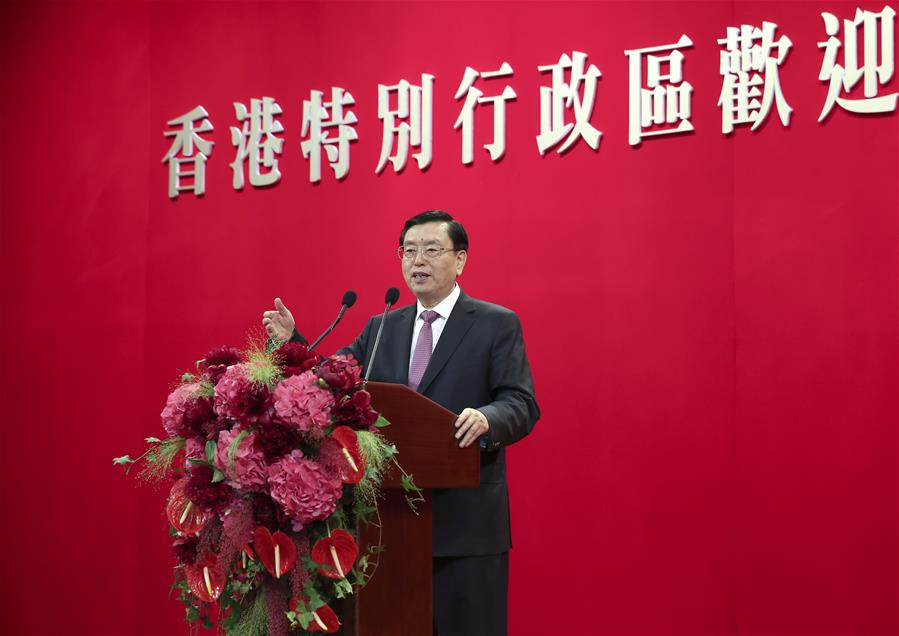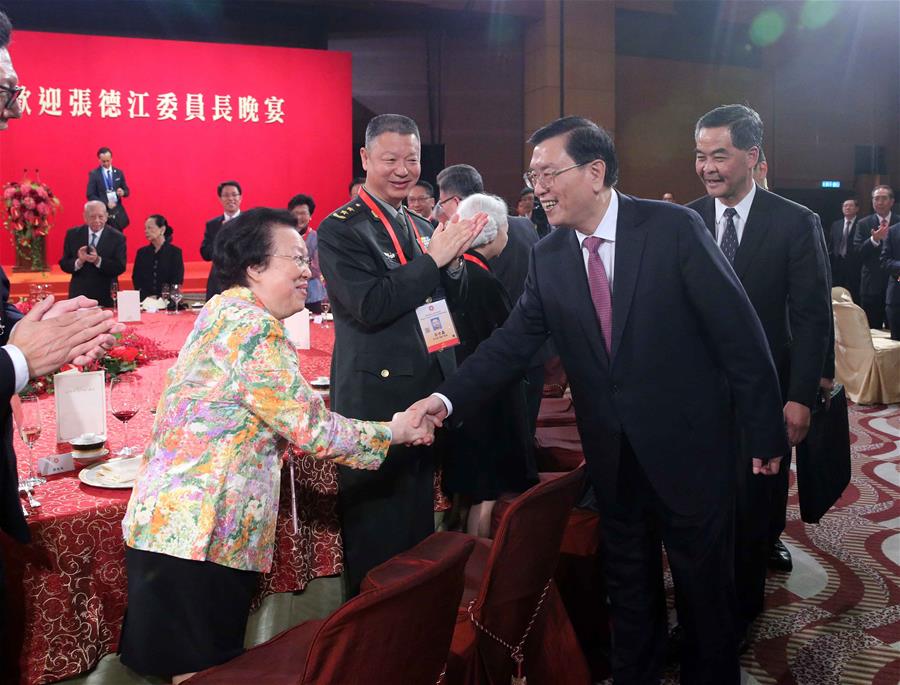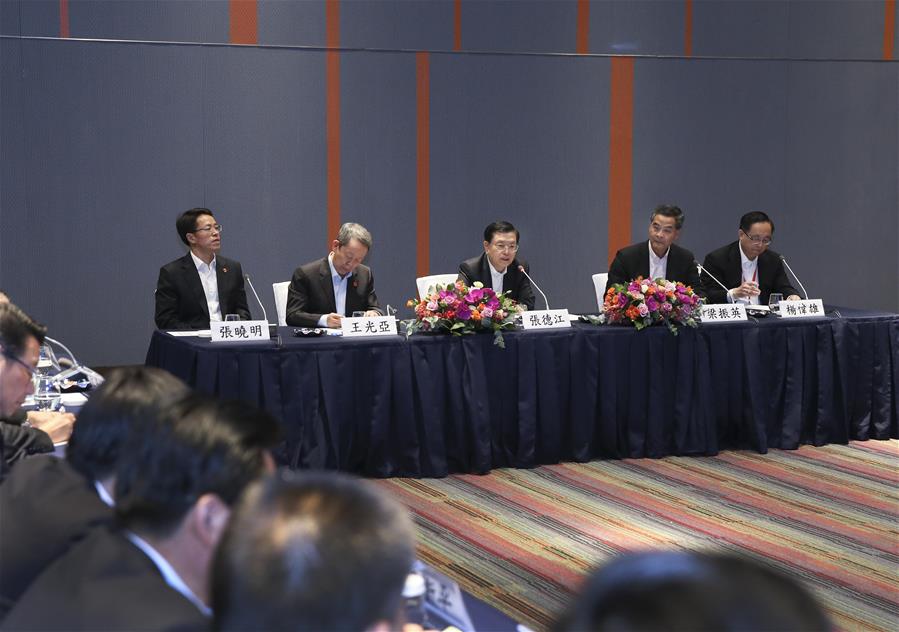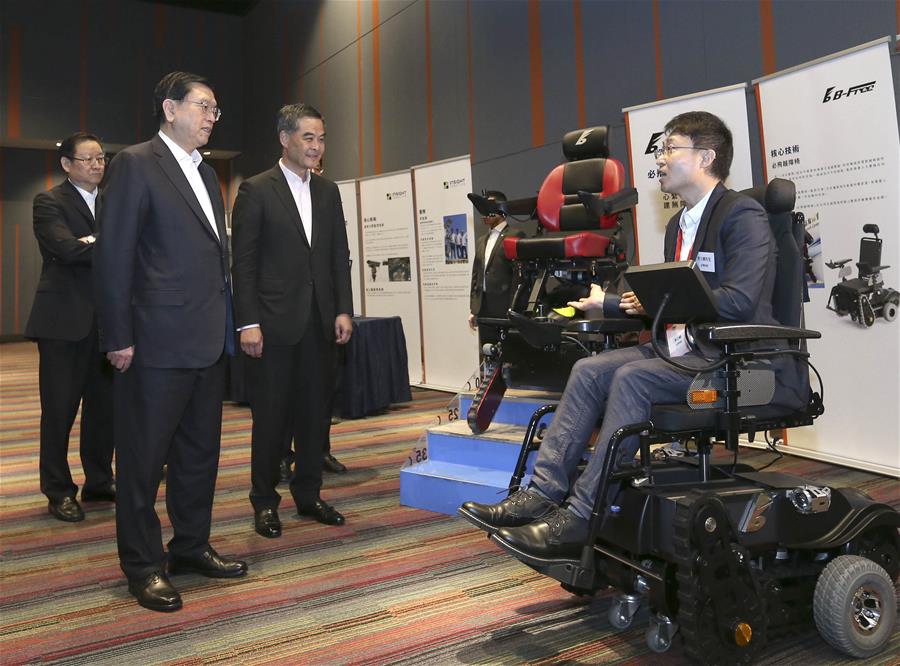Full coverage: Top Chinese legislator attends Belt and Road Summit
Full coverage: China’s Leaders
HONG KONG, May 18 (Xinhua) -- China's top legislator Zhang Dejiang on Wednesday called for strong confidence in the "one country, two systems" principle and Hong Kong's future.

Zhang Dejiang, chairman of the Standing Committee of China's National People's Congress, delivers a speech during a welcome dinner in Hong Kong, south China, May 18, 2016. (Xinhua/Pang Xinglei)
With regard to the "one country, two systems" principle, people should hold on to its original intention, maintain patience and strengthen confidence, Zhang, chairman of the Standing Committee of the National People's Congress, said in a speech delivered at a welcome dinner.
In his speech, Zhang touched upon a series of issues related to the "one country, two systems" principle that concern the Hong Kong society.
Referring to the issue of "localism," he said one of the contents of the "one country, two systems" principle is maintaining Hong Kong's original social and economic system as well as people's way of life, and "Hong Kong people administering Hong Kong" with a high degree of autonomy.
However, very few people are making use of Hong Kong's uniqueness to reject "one country", resist the central government and even advocate "Hong Kong independence," said Zhang, noting that these acts are not about "localism," but aimed at "separation."
Zhang said the "one country, two systems" principle, a fundamental state policy and a strategic choice, not a makeshift, will not be changed.
He said the "one country, two systems" principle, which is widely acclaimed, is the largest denominator between the mainland and Hong Kong and should not be changed.
Moreover, the "one country, two systems" principle which is a good and feasible system well tested since Hong Kong's return to the motherland need not be changed, he added.
Hong Kong has an important position in the overall situation of the country, Zhang said.
He said the central government will unswervingly implement the principles of "one country, two systems," and "Hong Kong people administering Hong Kong" with a high degree of autonomy, unswervingly support the Hong Kong Special Administrative Region government in administering the region according to the law, and conducting mutually beneficial cooperation with the mainland.
Before the event, Zhang held discussions with more than 40 participants, including principal officials of the Hong Kong SAR government, non-official members of the Executive Council, some members of the legislative council, chief justice of the Court of Final Appeal and chief justice of the High Court, and representatives of District Council chairmen.
Earlier on Wednesday, Zhang inspected the Hong Kong Science Park and heard briefings about the development of innovative science and technology in Hong Kong.
Zhang also held discussions with Hong Kong's scientific research personnel as well as young entrepreneurs, after watching product displays in the Hong Kong Science Park.
In terms of developing innovative science and technology, Hong Kong has quite a number of advantages and is facing rare opportunities, Zhang said.
He hoped the Hong Kong SAR government and the science sector will seize the opportunities and carry out cooperation between the government, manufacturers, academic organizations and research bodies, and step up efforts in cooperating with the mainland as well as cultivating and introducing innovative talents, so that innovative science and technology can serve as a new engine for Hong Kong's economic development.

Zhang Dejiang (R front), chairman of the Standing Committee of China's National People's Congress, shakes hands with guests at a welcome dinner in Hong Kong, south China, May 18, 2016. (Xinhua/Liu Weibing)

Zhang Dejiang (C), chairman of the Standing Committee of China's National People's Congress, inspects the Hong Kong Science Park in Hong Kong, south China, May 18, 2016. (Xinhua/Pang Xinglei)

Zhang Dejiang (2nd L), chairman of the Standing Committee of China's National People's Congress, inspects the Hong Kong Science Park in Hong Kong, south China, May 18, 2016. (Xinhua/Pang Xinglei)















